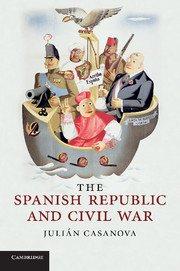Book contents
- Frontmatter
- Contents
- List of maps
- Chronology
- Introduction
- Part I Republic
- 1 The winds of change
- 2 The constraints of democracy
- 3 Order and religion
- 4 Reshaping the Republic
- 5 The seeds of confrontation
- Part II Civil war
- Epilogue: Why did the Republic lose the war?
- Glossary
- Appendix 1 Leading figures
- Appendix 2 Political parties and organisations
- Index
- References
2 - The constraints of democracy
Published online by Cambridge University Press: 05 June 2012
- Frontmatter
- Contents
- List of maps
- Chronology
- Introduction
- Part I Republic
- 1 The winds of change
- 2 The constraints of democracy
- 3 Order and religion
- 4 Reshaping the Republic
- 5 The seeds of confrontation
- Part II Civil war
- Epilogue: Why did the Republic lose the war?
- Glossary
- Appendix 1 Leading figures
- Appendix 2 Political parties and organisations
- Index
- References
Summary
The political change of April 1931 arrived charged with hope and promise. It heralded the end of a corrupt and decadent past, and many people were hoping for a radical change of direction. No aspect of political or social life was excluded from the scope of reforms undertaken by the provisional government or those led by Manuel Azaña between October 1931 and September 1933. Over two years of feverish legislative activity were given over to the reorganisation of the army, the separation of Church and State, and the implementation of comprehensive radical measures with regard to land-ownership, workers' wages, employment protection and public education.
With republicans and socialists in the government, messages of hope and fear were soon to be heard all over Spain, with pressure from the higher and lower echelons of society to block the revolution that was under way or to eliminate all traces of the past monarchy. The labouring classes, with their organisations, protests and mobilisations, appeared on the public scene, in the streets, in Parliament and in the institutions, as a powerful force that could no longer be excluded from the political system. The old ruling classes, property owners and conventional society, displaced from power by the new republican regime, reacted energetically and resoundingly to the reforms. This mixture of great hopes, reforms, conflicts and resistance was what marked the Republic during its first two years. Never before had Spain experienced such an intense period of change and conflict, democratic advances or social conquests.
- Type
- Chapter
- Information
- The Spanish Republic and Civil War , pp. 37 - 63Publisher: Cambridge University PressPrint publication year: 2010



